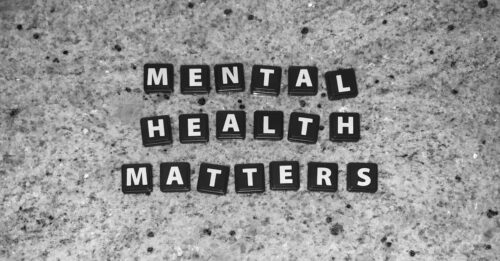Health & Mental Health
Looking after your health is important anytime but being prepared for a health emergency, or to manage chronic health conditions in the wake of a natural disaster requires thinking ahead.
Additionally, research shows people in flood-affected areas have a higher likelihood of heightened psychological distress, anxiety, depression and post-traumatic stress disorder – our community is vulnerable.
That’s why it’s important to look after our mental health, not just when we reach crisis point but day-to-day as part of our personal and community resilience.
STEP 1: Know Your Risk
Identify the natural disasters that could impact your physical or mental health.
Analyse how these risks may impact your life including your physical assets, your online systems, your business, your employees, your financial arrangements, and of course, yourself.
Make a plan.
Understand the environment you live in and be prepared for any types of natural disasters.
Being prepared means that you’ll be able to minimise your stress as well as support those around you during an emergency.
STEP 2: Make a Plan
- Know your risk (i.e. if you have asthma then bushfires may be a particular risk for you; if you have a heart condition, heatstroke may be an issue; and if you suffer anxiety or have PTSD from a previous disaster then any natural disaster may be a trigger point for you).
- If you do not have home and/or contents insurance, be aware that it is an important way to reduce risk and could make all the difference to recovery after a natural disaster.
- If adequate insurance cover is not available, consider seeking the support of an insurance broker to better understand your risk profile, coverage required and to negotiate with insurers.
- Some data and items are irreplaceable (examples include business registration records, financial records, property deeds, family photos, and customer data).
- Make sure your data is backed up and stored in a secure location (offsite or in cloud-based storage). – Click here to learn how to back up.
- Prepare an emergency contact list.
- Make your emergency plan
- Review evacuation procedures.
- Prepare an emergency kit and include a first aid kit and any medications you may need to manage chronic health conditions in the days after a disaster.
- Have a plan for managing short-term financial obligations. If you have a business, think about how you will return to work and the impacts on your employees.
Watch the video below on managing stress (RAMHP)
STEP 3: Prepare Yourself Psychologically
The three steps to being psychologically prepared:
1. Anticipate
that you will be feeling worried or anxious and remember these are normal, although not always helpful, responses to a possible life-threatening situation.
2. Identify
the specific physical feelings associated with anxiety and whether you are having any frightening thoughts that are adding to the fear.
3. Manage
your responses using controlled breathing and self-talk so that you stay as calm as possible and can focus on the practical tasks that need attention.
The following information may help to prepare you for natural disasters
by Australian Psychological Society (APS)
The Australian Red Cross have put together information on preparing yourself for natural disasters. Check the link below for how to prepare your mind.
Go to the Red Cross’ ‘Prepare your Mind’ page
Attempt this worksheet to help you to identify your anticipated stressors, the feelings and thoughts they may provoke, and prompt you to think about how you can invest in your wellbeing
Download the Red Cross’ ‘Prepare your Mind’ worksheet
To stay informed, go to the Useful Apps & Links page to download relevant apps and links.
Step 4: Managing your Physical and Mental Health in and after a Natural Disaster

Image: Unsplash / Marcel Strauß
Going though a natural disaster can impact on your physical and mental health and wellbeing. It’s important that you and the people around you seek appropriate support.
If you are injured or having other health issues that require attention, obviously the first port of call is to call 000, get to a hospital or GP clinic or call Health Direct on 1800 022 222 for general advice.
However if communications are down and emergency services are unable to get to you, reach out to your neighbours for support. In previous disasters, our community has worked together spontaneously to access emergency medical supplies and medications for people, to support people having a mental health episode, and local nurses and doctors have been available to dress wounds or support people until they can get to hospital.
RUKI is working with local health professionals and counsellors who live in our community on having a more coordinated approach to health emergencies in a disaster so watch this space.
Mental Health Support
Find disaster recovery services and support in the following link.
Go to ‘nema.gov.au’ Mental Health Resources
A tool to check in on yourself
The NSW government page below provides information on how to manage your mental health.
Go to ‘nsw.gov.au’ Mental Health page
Where to find support:
- Talk to your doctor or medical professional
- Visit a Safe Haven community support and wellbeing hub to access free on-the-spot services and advice 7 days a week (the closest one to Greater Uki area is in Murwillumbah at Shop 10-12, 41-45 Murwillumbah Street, Murwillumbah)
- Find your local Rural Adversity Mental Health Program (RAMHP) coordinator here.
- Access support through telehealth services
- Know that there is support available – Lifeline on 13 11 14, Beyond Blue on 1300 224 636, Kids Helpline on 1800 551 800, 13YARN (13 92 76) for Aboriginal and Torres Strait Islander People.
- Support for young people is available through Headspace – check their natural disasters page.
- Specialist mental health Bushfire Recovery Clinicians are available in bushfire-affected regions across NSW. To get in contact with a Bushfire Recovery Clinician, contact the NSW Mental Health Line on 1800 011 511
Mental health support after a bushfire
Go to the link below, If you require support after a bushfire.
Go to RAMHP’s ‘Bushfire Recovery’ page
Mental health support after a flood
Go to the link below, If you require support after a flood.
Go to RAMHP’s ‘Flood Recovery’ page
Mental health support after a drought
Go to the link below, If you require support after a drought.
Go to RAMHP’s ‘Drought Recovery’ page
Support for rural men
Call Mensline Australia 1300 789 978
Go to the ‘You Got This Mate’ site
Recognising PTSD and getting help
Post-traumatic stress disorder is when memories of a traumatic event are relived and affect a person physically and/or emotionally. Flashbacks can be triggered by sounds, smells and images.
The link below provides advice on what to do if you are suffering from PTSD following a natural disaster.
Services for older people
Go to Red Cross’ ‘Services for older People’ page
Recovery Basics
The Australian Red Cross have put together important information below on looking after yourself during and after disasters.
STEP 5: Connect with your Neighbours and Community Network
Getting to know your neighbours is an important part of preparing your household.
Neighbours can help each other in many ways including checking on each other and supporting each other after natural disasters.

Photo by Priscilla Du Preez 🇨🇦 on Unsplash
RUKI’s Neighbourhoods Group project was made possible with support from The Community Wellbeing and Resilience Flood Recovery Grant Program, which is funded by Healthy North Coast through the North Coast PHN Program.
Through this program, we are training a network of “Resilient First Aid” responders and we will be sharing more on this in our community in 2024, with opportunities for us all to learn better ways to keep ourselves resilient in an unpredictable world.
We also partnered with Plan C on their Community Carers and Responders Program in 2023, so there are more and more people in our community learning how to better look after themselves and others.
Stay informed and go to the useful Apps, Numbers & Links page to download relevant apps and bookmark links.
CALL 000 in an Emergency
Call Health Direct on 1800 022 222 for general health advice
(free 24-hour NSW government health line)